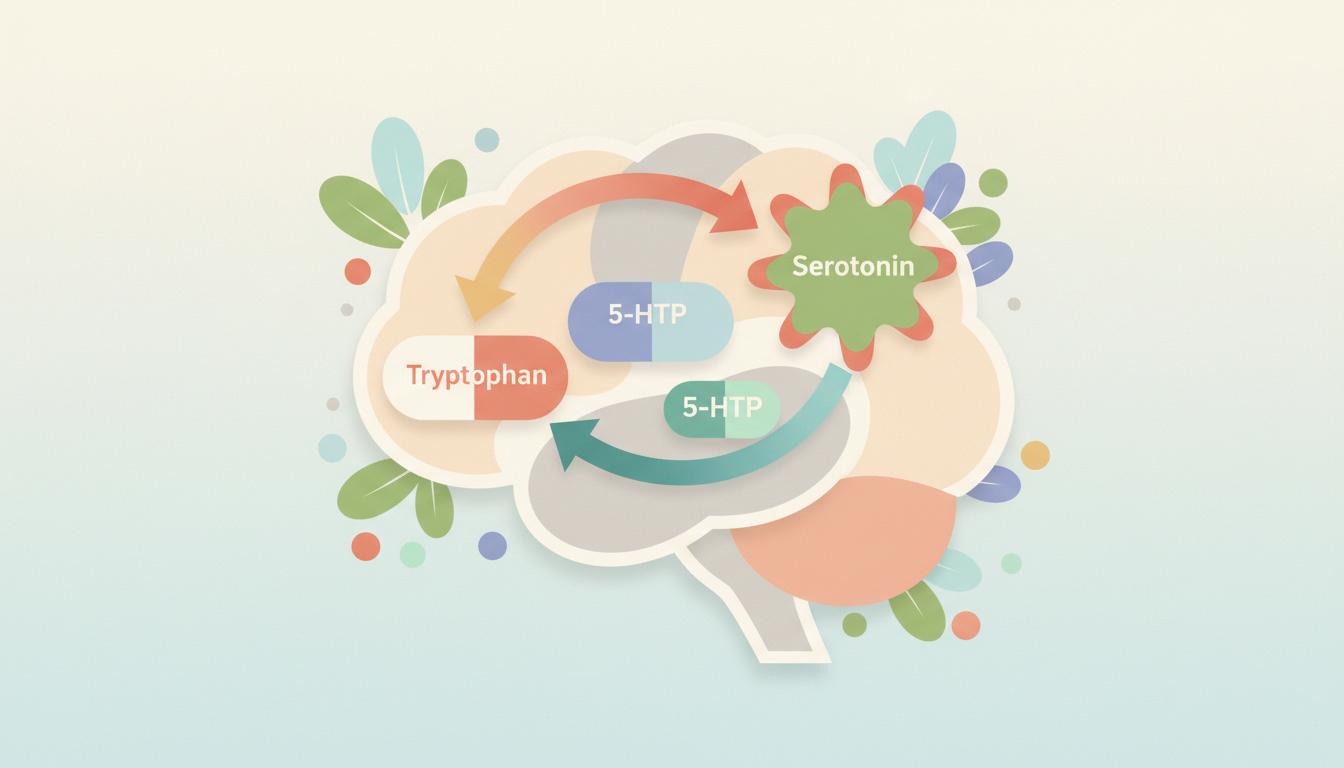St. John's Wort vs. 5-HTP: Which Mood Support Supplement is Right for You?
St. John's Wort vs. 5-HTP: Which Mood Support Supplement is Right for You?

Navigating Natural Mood Support: St. John's Wort vs. 5-HTP
When exploring natural options for mood support, St. John's Wort and 5-HTP are two of the most frequently mentioned supplements. Both are widely available and interact with the brain's chemistry, but they do so in fundamentally different ways. Understanding these differences is crucial for safety and for choosing a supplement that aligns with your individual needs. This article provides an evidence-based comparison to clarify their distinct mechanisms, scientific backing, and critical safety considerations.
Here is a quick summary of what we will cover:
- How They Work: St. John's Wort has a broad action on multiple brain chemicals, including serotonin, norepinephrine, and dopamine. In contrast, 5-HTP is a direct building block, or precursor, for serotonin only.
- Scientific Evidence: St. John's Wort is supported by a substantial body of research, including numerous clinical trials, showing its effectiveness for mild to moderate depression. The evidence for 5-HTP is much more limited and is based on smaller, often older, studies.
- Safety Profile: Both supplements carry risks. St. John's Wort is known for its extensive interactions with prescription medications, which can make them less effective. 5-HTP's primary risk is serotonin syndrome, especially when combined with antidepressants.
- Informed Choice: The decision between the two is not one-size-fits-all. It requires a careful review of your health status, current medications, and a thorough discussion with your healthcare provider.
Understanding St. John's Wort (Hypericum perforatum)
St. John's Wort is an herb with yellow, star-shaped flowers that has been used for medicinal purposes for centuries. In modern times, it has become one of the most studied herbal remedies for mood. Standardized extracts are typically prepared from the plant's flowering tops.S2
Mechanism: A Broad Approach
Initially, scientists believed St. John's Wort worked like prescription SSRIs (Selective Serotonin Reuptake Inhibitors) by simply increasing serotonin. However, research has shown its mechanism is much more complex. Its active compounds, primarily hyperforin and hypericin, appear to influence the levels of several important neurotransmitters—brain chemicals that regulate mood. These include not only serotonin but also norepinephrine and dopamine. This broad action may explain why its effects can be so potent. It doesn't just target one pathway; it seems to provide a more widespread balancing effect on the brain's communication systems.S1S2
The Evidence: What Do Studies Show?
St. John's Wort is one of the few herbal supplements with robust scientific backing for a specific condition. Multiple high-quality studies and systematic reviews have compared it to both placebo and standard antidepressant medications. A landmark 2008 review from the Cochrane Collaboration, which analyzed 29 trials involving over 5,000 patients, concluded that extracts of St. John's Wort were superior to placebo and similarly effective as standard antidepressants for treating mild to moderate depression. The review also noted that St. John's Wort led to fewer side effects than the prescription drugs.S1
It's important to note that while effective for mild to moderate cases, St. John's Wort is not considered an appropriate treatment for severe or major depression. Its efficacy in these cases has not been well established.

Understanding 5-HTP (5-Hydroxytryptophan)
5-HTP is not an herb but a compound that the body naturally produces from the amino acid L-tryptophan, which is found in foods like turkey and dairy. In the body, 5-HTP is the direct precursor to serotonin. The 5-HTP used in supplements is most commonly extracted from the seeds of an African plant, Griffonia simplicifolia.S4
Mechanism: A Direct Serotonin Pathway
The appeal of 5-HTP lies in its straightforward biological role. Your brain's mood-regulating system follows a simple production line: L-Tryptophan is converted into 5-HTP, which is then converted into serotonin. By taking a 5-HTP supplement, you are essentially skipping the first step and providing the brain with the immediate raw material it needs to make more serotonin. The thinking is that by increasing the building blocks, you can increase the final product, potentially improving mood, sleep, and anxiety.S4S7
The Evidence: Promising but Limited
Compared to St. John's Wort, the scientific evidence for 5-HTP is significantly less conclusive. Much of the research consists of small, older studies that lack the rigorous design of modern clinical trials. A 2002 Cochrane review looked at the available data for 5-HTP and its parent compound, tryptophan, for depression. The authors found only a small number of studies, most from the 1970s and 80s, and concluded that the evidence was of poor quality and insufficient to make a firm judgment. While some individuals report benefits, the scientific community generally agrees that larger, high-quality, and more recent studies are needed to confirm its effectiveness and establish proper dosing and long-term safety.S3
Critical Differences: Safety, Interactions, and Side Effects
The most important factor in choosing between these supplements often comes down to their safety profiles, particularly how they interact with other substances. This is where they differ most dramatically.
St. John's Wort: The Interaction Risk
The primary concern with St. John's Wort is its powerful effect on liver enzymes, specifically an enzyme called cytochrome P450 3A4. This enzyme is responsible for breaking down and clearing a vast number of medications from the body. By speeding up this enzyme, St. John's Wort can cause the body to metabolize certain drugs too quickly, reducing their effectiveness.
This can have serious consequences. Key interactions include:S2S5
- Antidepressants (SSRIs, SNRIs): Combining them greatly increases the risk of serotonin syndrome, a potentially life-threatening condition caused by excessive serotonin levels. Symptoms include agitation, confusion, rapid heart rate, and high blood pressure.
- Oral Contraceptives: St. John's Wort can reduce the effectiveness of birth control pills, leading to unplanned pregnancy.
- Blood Thinners (e.g., Warfarin): It can decrease the drug's effect, increasing the risk of blood clots.
- Immunosuppressants: Organ transplant recipients must avoid it, as it can reduce levels of anti-rejection drugs.
- Certain Heart Medications & Cancer Drugs: Its effects can interfere with many critical treatments.
Warning: Due to its extensive drug interactions, you must disclose your use of St. John's Wort to your doctor and pharmacist. Never combine it with prescription antidepressants without direct medical supervision.
5-HTP: The Serotonin Syndrome Risk
The main safety concern with 5-HTP is also serotonin syndrome. Because it directly increases serotonin production, combining it with any other substance that also boosts serotonin—like SSRIs, MAOIs, or even St. John's Wort—is dangerous and should be avoided. Common side effects are typically gastrointestinal and include nausea, heartburn, and diarrhea, especially at higher doses. There have been theoretical concerns about long-term use and potential effects on heart valve health, but this is not well-established in humans. The risk of a past contaminant causing eosinophilia-myalgia syndrome (EMS) has been virtually eliminated with modern manufacturing standards, but choosing high-quality brands is still important.S6S4
Frequently Asked Questions
No, this is strongly advised against. Taking both supplements at the same time significantly increases the risk of developing serotonin syndrome, a serious medical condition that requires immediate attention.
St. John's Wort typically requires consistent use for several weeks, often 3 to 6, before a noticeable improvement in mood is observed, which is similar to many prescription antidepressants. The time to effect for 5-HTP is less certain due to limited research, though some anecdotal reports suggest effects may be felt more quickly.
They are not directly comparable in terms of strength. St. John's Wort has a more complex mechanism of action and is supported by much stronger clinical evidence for treating mild to moderate depression. 5-HTP has a more direct impact on serotonin, but its overall effectiveness for mood is not as well-proven.
In the United States, both St. John's Wort and 5-HTP are classified as dietary supplements and are available over the counter. However, in some other countries, such as Germany, St. John's Wort is regulated as a prescription drug, reflecting its recognized biological activity and potential for interactions.
Summary and Key Takeaways
Choosing between St. John's Wort and 5-HTP requires careful consideration of the evidence and a clear understanding of the potential risks. Neither should be taken lightly or without professional medical advice.
Here are the final points to remember:
- St. John's Wort: Has a broad mechanism of action and is backed by strong scientific evidence for mild to moderate depression. Its main drawback is a high potential for interacting with many common prescription medications.
- 5-HTP: Works as a direct precursor to serotonin. The scientific evidence for its effectiveness in treating depression is weak and outdated. Its primary risk is serotonin syndrome when combined with other serotonergic agents.
- Consult a Professional: Your first and most important step should always be to speak with a doctor or qualified healthcare provider. They can help diagnose your symptoms properly and review your current medications to prevent dangerous interactions.
- Safety First: Never combine either supplement with prescription antidepressants or with each other. Always prioritize safety and transparency with your healthcare team about any supplements you are considering.
Sources
- St John's wort for major depression (2008) — link [Systematic Review]
S1 - St. John’s Wort and Depression: In Depth (2020) — link [Web Page]
S2 - Tryptophan and 5-hydroxytryptophan for depression (2002) — link [Systematic Review]
S3 - 5-Hydroxytryptophan: a clinically-effective serotonin precursor (1998) — link [Review Article]
S4 - Interactions between herbal medicines and prescribed drugs: a systematic review (2009) — link [Systematic Review]
S5 - Serotonin syndrome (2013) — link [Review Article]
S6 - 5-HTP efficacy and contraindications (2012) — link [Review Article]
S7